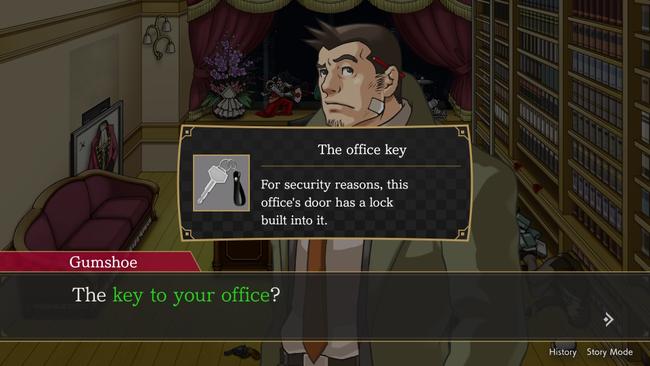
Ace Attorney Investigations Collection Review
With the debut of the Ace Attorney Investigations Collection, pretty much every original Ace Attorney title (save the Professor Layton crossover game) is available to play on modern platforms. Whether on Nintendo Switch, PC, PS4, or Xbox One, you can now play through Phoenix Wright's story via the Phoenix Wright: Ace Attorney Trilogy, Apollo Justice's story (sort of) via the Apollo Justice: Ace Attorney Trilogy, go back in time to see the dawn of detective work in The Great Ace Attorney Chronicles, and then see the other side of the line with Ace Attorney Investigations: Miles Edgeworth and Ace Attorney Investigations 2: Prosecutor's Gambit.
For those experiencing the series for the first time via the collections, here's some necessary background: Miles Edgeworth first launched on the Nintendo DS in 2009 in Japan, with Prosecutor's Gambit following in 2011. These games' stories form a bridge of sorts between Phoenix Wright: Ace Attorney - Trials and Tribulations and the years-later time period of Apollo Justice. Starring the titular prosecutor, Miles Edgeworth and its sequel show off the prosecutorial side of the Ace Attorney universe, and are meant to focus more on raw detective work and investigation rather than the lawyerly gambits and courtroom drama of a standard Ace Attorney title.
Ace Attorney Investigations makes a solid effort to differentiate itself from the main games through a few meaningful changes in framing. Not a single moment takes place in the traditional Ace Attorney trial setting, outside of a few key flashbacks. These games also break free of the relatively rigid temporal structure of Ace Attorney's crazy three-day "initial trial" system. That said, Ace Attorney Investigations goes all-in on its own form of absurd time compression. Though the three-day trial may be out, the entire narrative of both games takes place over what might be seen as the most stressful and intense working fortnight of Miles Edgeworth's career. In fact, all five cases of the first game alone take place over a period of four days, with murders and kidnappings occurring seemingly every place Miles steps foot, even inside his own office.
That silliness aside, the tightly packed nature of the case flow lends itself well to establishing a sense of continuity that regular Ace Attorney games sometimes lack. Oftentimes, by the last case of an Ace Attorney game, I'd struggle to remember all the different narrative threads connecting them, but across both Miles Edgeworth and Prosecutor's Gambit, the throughlines remained clear in my head, forming a more cohesive-feeling narrative tapestry.

The sense of narrative connection helps a lot in light of both games being present in the Ace Attorney Investigations collection, because if just taken alone, Miles Edgeworth suffers somewhat in comparison to the main games, simply because the stakes feel strangely low-key. This is in part due to the games abandoning the typical defense attorney framing. With Miles mainly striving to uncover the "truth" of what happened in each case rather than trying to save a hapless client from a system seemingly rigged in the prosecution's favor the way Phoenix has to, the first game's revelations can sometimes feel underwhelming.
That is, it would feel this way in 2012 or so, when Miles Edgeworth was released on its own and English-speaking players later received the news that its sequel wouldn't be localized. In the context of the Ace Attorney Investigations Collection, Miles Edgeworth benefits enormously from being treated like the first half of a single, much longer game. The plot no longer seems to lose steam and the villain of the piece no longer feels a little undercooked, but instead becomes the satisfying preamble to the sheer rollercoaster intensity of Prosecutor's Gambit's cases.

The games also distinguish themselves by adopting a framing that's more reminiscent of point-and-click adventure games than the main Ace Attorney series. Rather than transitioning in first-person between a series of screens, players have direct control over Miles, moving through the environment to examine each point of interest up close. For the Ace Attorney Investigations Collection, Capcom also brought the background art up to HD resolutions and added a full selection of new HD character sprites to replace the pixel art renditions from the original games. Better still for purists, the original art style is still available in full (including the more pixelated backgrounds). I personally prefer the new style, as it meshes much better with high definition resolutions. The clever pixel art tricks that the original art style used to convey the character designs on the Nintendo DS's dinky screen simply don't look as nice in proper HD, but it's good that the option is there. A gallery and music player round out the extras.
Finally, both Miles Edgeworth and Prosecutor's Gambit feature two major systemic departures from the mainline Ace Attorney games, ones focused on Mile's razor-sharp deductive skills and the investigative focus of the games. The "Logic" system works like a meta-layer of the usual clue and evidence collection of an Ace Attorney game. Miles can gather "Facts" during the investigation, then hop into a Logic mode to try to connect related Facts together to open up new angles of investigation or uncover new clues. Prosecutor's Gambit also introduces "Mind Chess," a conversational minigame that has Edgeworth confronting a belligerent or uncooperative subject and breaking down their defenses using rhetorical gambits. Mind Chess adds a healthy bit of time pressure to Ace Attorney's typically stately pace of progression, though substantially, it's easy to see how both new gameplay systems map onto the things Ace Attorney has always done.

And there's the rub. Despite all the Ace Attorney Investigations games do to set themselves apart from the main series, the fact of the matter is that the differences are ultimately somewhat superficial. You may not be doing trials anymore, but you're still interrogating subjects, finding clues, pinpointing contradictions and flaws in their testimony, presenting evidence to highlight the issues, and breaking past their rhetorical or emotional defenses to get at the truth. Oftentimes, there's even someone wrongfully accused and in need of defending from everyone's favorite prosecutor. Even Kay Faraday, the main new character addition, functions as Edgeworth's version of Trucy to Apollo or Maya to Phoenix. Heck, Prosecutor's Gambit makes all this commonality between prosecution and defense into something of a running theme, indicating that even the team at Capcom's always known that Ace Attorney titles have always been much more detective games than lawyer games.
That said, I'm not complaining at all! More Ace Attorney, starring some of the series' best characters and cases, and featuring a cavalcade of cameos from the original trilogy (plus a few from Apollo Justice) is a dream come true, particularly for fans who had resigned themselves to seeing Prosecutor's Gambit as the kind of title one will only ever play with fan patches or emulation.
Capcom's done right by Ace Attorney in recent years, bringing it to modern platforms with a few convenient enhancements and in the doing, adding dozens of hours more of some of gaming's best storytelling to enjoy.